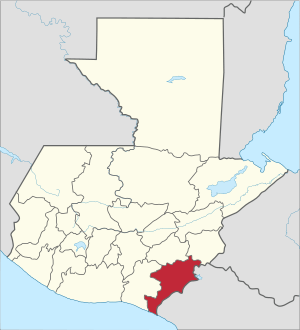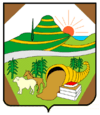Jutiapa Department facts for kids
Quick facts for kids
Jutiapa Department
Departmento de Jutiapa
|
|||
|---|---|---|---|
|
|||

Location of the Jutiapa Department in Guatemala
|
|||
| Country | |||
| Capital | Jutiapa | ||
| Municipalities | 17 | ||
| Government | |||
| • Type | Departmental | ||
| Area | |||
| • Department | 3,219 km2 (1,243 sq mi) | ||
| Population
(2018)
|
|||
| • Department | 488,395 | ||
| • Density | 151.723/km2 (392.96/sq mi) | ||
| • Urban | 249,754 | ||
| • Religions | Roman Catholicism Evangelicalism | ||
| Time zone | UTC-6 | ||
The Jutiapa Department is a special region in Guatemala. It is like a state or province. This department is located in the southeastern part of the country. It shares a border with El Salvador to the east. To the south, it touches the Pacific Ocean.
The main city and capital of the Jutiapa Department is Jutiapa. This is where the government of the department is located. In 2018, about 488,395 people lived in the Jutiapa Department.
What is a Department?
In Guatemala, a department is a major way the country is divided. It helps organize the government and services for people. Each department has its own capital city. This system is similar to how states work in some other countries.
Cities and Towns
The Jutiapa Department is made up of many smaller areas. These areas are called municipalities. Each municipality has its own local government. There are 17 municipalities in Jutiapa Department.
- Agua Blanca
- Asunción Mita
- Atescatempa
- Comapa
- Conguaco
- El Adelanto
- El Progreso
- Jalpatagua
- Jerez
- Jutiapa
- Moyuta
- Pasaco
- Quesada
- San José Acatempa
- Santa Catarina Mita
- Yupiltepeque
- Zapotitlán
Geography and Climate
Jutiapa Department has a varied landscape. It includes coastal areas along the Pacific Ocean. It also has inland regions with hills and valleys. The climate is generally warm. It can be hot and humid, especially near the coast.
Economy and Life
Many people in Jutiapa Department work in farming. They grow crops like coffee, sugar cane, and corn. Livestock farming, such as raising cattle, is also important. The department's location near the Pacific Ocean means some communities also rely on fishing.
See also
 In Spanish: Departamento de Jutiapa para niños
In Spanish: Departamento de Jutiapa para niños
 | Bessie Coleman |
 | Spann Watson |
 | Jill E. Brown |
 | Sherman W. White |



